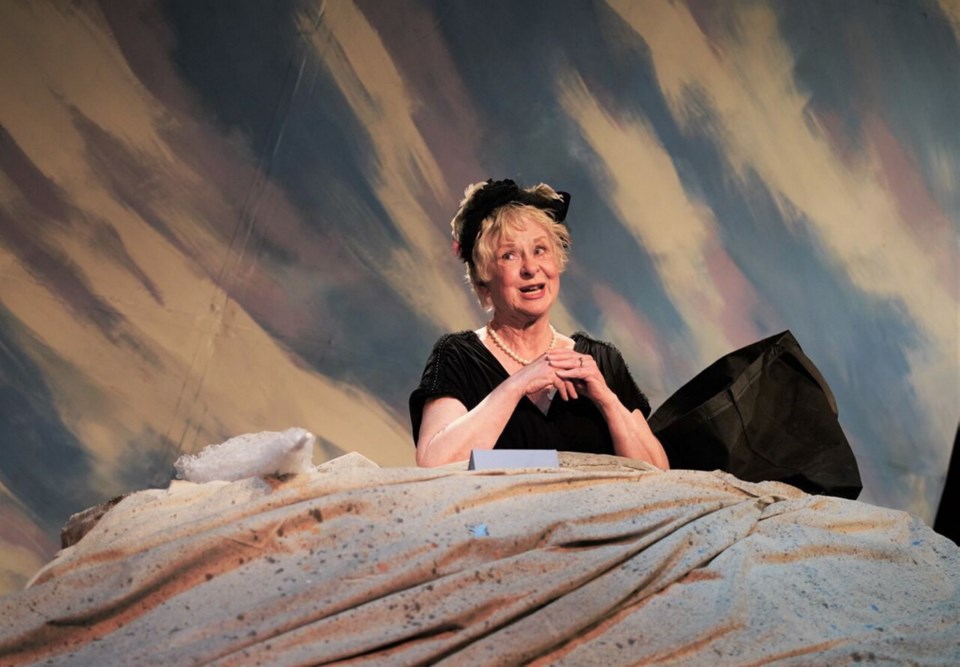At least one actress called it a Hamlet for female actors. Playing Winnie in Samuel Beckett’s Happy Days is a monumental challenge in a myriad of ways.
The role is absolutely immense — the two-act play is essentially a 90-minute monologue. And it’s a very strange part. Winnie’s musings are rambling, stream-of-consciousness, her thoughts seemingly plucked from the atmosphere. Then there’s the bizarre fact Winnie is somehow plunged into a hillock like a stick — we see her waist-up in Act I, with only her head appearing for the final scene.
If all of this wasn’t enough of a challenge, Blue Bridge Repertory Theatre’s new production of Happy Days was dogged by its own headaches. Shortly before rehearsals were to start, Norah McClellan left the show, reportedly for personal reasons. She was soon followed by director Don Shipley.
Happily, Happy Days was rescued by a new director, Arne Zaslove, and the fine actress Donna Belleville, who on Thursday night proved her mettle by delivering a powerful and moving performance. The two-person cast is rounded out by Michael Armstrong as Willie, a man of few words who faces the audience only at curtain call.
Happy Days is rarely staged in this city — I cannot remember another performance in the past 30 years. Blue Bridge’s Winnie is presented as an elegant middle-class woman in a black cocktail dress, matching hat and pearls. She is firmly encased in designer Hans Saefkow’s barren-looking hill of boulders and layered sand, with a geometric slab of post-apocalyptic sky mysteriously suspended above.
Winnie and Willie appear to have survived — or half-survived — some terrible crisis, perhaps a nuclear war or something quite like it. Their world is practically devoid of life. At one point, Winnie is thrilled to see a crawling insect carrying a “little white ball.” When we first meet her in the play she is awakened by the peal of a bell — in this production, the nerve-jangling sound of a fire-alarm. “Another heavenly day,” Winnie declares with determined optimism.
T.S. Eliot’s Prufrock measured out his life in coffee spoons; Winnie passes her happy days with mind-numbingly mundane tasks. She cleans her teeth and myopically examines her toothbrush, trying to decipher the words on the handle. She applies lipstick. She pulls from her bag a revolver, kisses it and places it nearby, appearing to take comfort that an escape route is close at hand.
Such sad little rituals divert the mind from the inevitability of death, a spectre that hovers over Happy Days like a black cloud. This is one of the play’s key themes — that the human condition is uniquely and grotesquely defined by our awareness of our inevitable demise.
What’s so touching about Winnie — and so well conveyed by Belleville — is her dogged attempts to be optimistic in the face of this. Any utterance from Willie is received by Winnie ecstatically as proof it is indeed a “happy day.” When life seems especially miserable she declares: “What does it matter? — that’s what I always say.” Winnie is stuck within an existential abyss. Her determination to simultaneously ignore and accept this is both pathetic and moving.
Another theme (and a favourite of Beckett’s) is the imperfectness and futility of human communication. Winnie strives valiantly to talk to Willie — she is desperate to be at least heard, even if he rarely responds. In fact, she is quite alone, adrift in a sea of memories and half-remembered classical quotations. Winnie spends her days grasping at random memories — a first kiss in a shed, a childhood doll — retrieved like forgotten objects at the bottom of a chest.
The unrelenting bleakness of Happy Days is alleviated, slightly, by Beckett’s dark humour. Winnie says: “Raise a finger, Willie, if you are still conscious.” Later, she calls out to her companion, who appears to have burrowed into the earth: “Weary of your hole, dear?” At the end, when Winnie is merely a head sticking out of the ground, she’s reduced to seeing if she can see the tip of her nose and tongue — a Monty-Pythonesque situation that’s funny, surreal and grotesque.
An essential challenge is making Winnie seem like a real person rather than a mere playwright’s contrivance. Belleville achieves this awfully well. The actress succeeds in capturing the character’s shift from forced optimism in Act I to anger, despair and acceptance in Act II. Her Winnie is profoundly affecting, a living and breathing embodiment of the human condition. What more can one ask?



